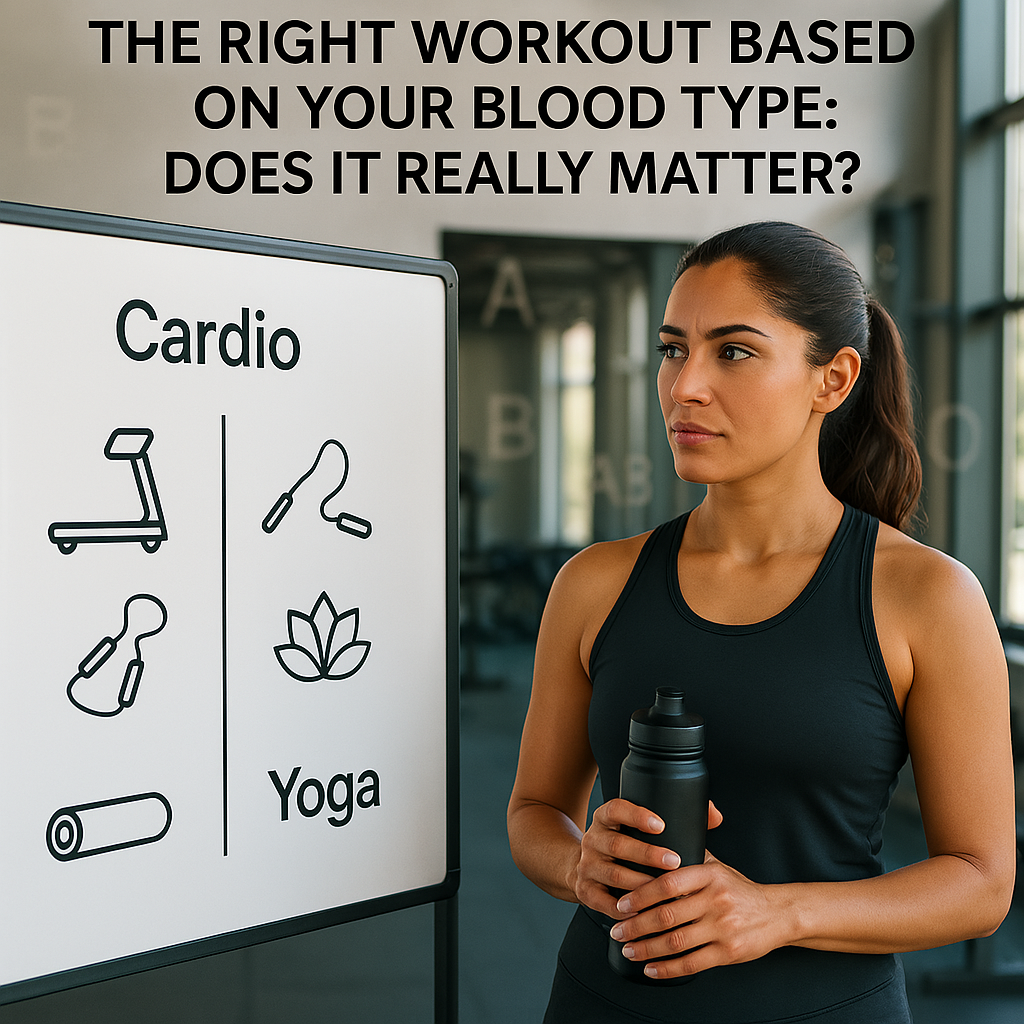Introduction
The concept of tailoring workouts based on blood type has gained attention in fitness and health communities. Some believe that understanding blood type can help optimize exercise routines for better results, while others argue that there is little scientific evidence to support this idea. This article explores the relationship between blood type and exercise, the science behind it, and whether it genuinely affects performance, weight loss, and overall fitness.
Understanding Blood Type and Its Role in the Body
Before diving into blood type-based workouts, it's essential to understand what blood type is and how it affects our health. The four main blood types are:
Type O
Type A
Type B
Type AB
Each blood type has specific characteristics that influence digestion, metabolism, and immune function. Proponents of blood type fitness theories suggest that these factors also impact how individuals respond to exercise.
Blood Type and Exercise: A Breakdown
1. Type O: The High-Energy Athlete
Type O individuals are often linked to having a strong digestive system and a higher ability to metabolize proteins and fats. Advocates of blood type workouts suggest that Type O people should engage in high-intensity workouts, including:
Cardio-intensive exercises (running, cycling, HIIT)
Strength training (weightlifting, resistance exercises)
Martial arts (boxing, kickboxing, Muay Thai)
Endurance sports (long-distance running, swimming)
Since Type O individuals are prone to inflammation and stress-related health issues, they benefit from stress-reducing activities like yoga or meditation.
2. Type A: The Yoga Enthusiast
People with Type A blood are believed to have a more sensitive immune system and a lower tolerance for stress. Thus, they may respond better to:
Low-impact exercises (walking, pilates, light jogging)
Yoga and meditation (to reduce stress and inflammation)
Stretching and flexibility training
Moderate strength training (bodyweight exercises, resistance bands)
Over-exertion or high-intensity workouts may lead to higher cortisol levels, making stress management essential for Type A individuals.
3. Type B: The Balanced Mover
Type B individuals are thought to have a balanced physiology that allows them to engage in a mix of different exercise styles. Recommended workouts include:
Moderate cardio (hiking, swimming, dancing)
Strength training (functional fitness, moderate weightlifting)
Martial arts and flexibility workouts (tai chi, yoga, pilates)
Group sports (tennis, basketball, football)
Type B individuals should focus on maintaining a balance between endurance, strength, and relaxation exercises to optimize fitness levels.
4. Type AB: The Hybrid Workout Lover
As a combination of Type A and Type B, Type AB individuals are believed to benefit from workouts that are not too extreme. Suggested exercises include:
Yoga and pilates (to enhance flexibility and mental relaxation)
Strength training (light to moderate resistance training)
Aerobic exercises (cycling, swimming, brisk walking)
Tai chi or qigong (to maintain balance and reduce stress)
Maintaining a moderate workout routine without overexertion is key for this blood type.
The Science Behind Blood Type and Exercise
The idea that blood type affects exercise performance stems from Dr. Peter D’Adamo’s book Eat Right for Your Type. However, scientific research on the direct link between blood type and fitness is limited.
Lack of conclusive studies: Most claims are based on anecdotal evidence rather than peer-reviewed research.
Individual differences matter more: Factors like genetics, lifestyle, age, and fitness level play a more significant role in determining the best workout.
Placebo effect: Some individuals may experience positive results simply because they believe in the approach.
While blood type might influence certain physiological aspects, experts generally agree that personalized fitness should be based on goals, preferences, and overall health rather than blood type alone.
Pros and Cons of Blood Type-Based Workouts
Pros:
Encourages a personalized approach to fitness.
Focuses on holistic well-being, including stress management.
Promotes a balance between high-intensity and low-impact exercises.
Cons:
Lacks strong scientific backing.
May restrict individuals from trying diverse workout routines.
Ignores other crucial factors like diet, genetics, and medical history.
Alternative Ways to Personalize Your Workout
If you're looking for an effective workout plan, consider the following factors instead of blood type:
Fitness goals (weight loss, muscle gain, endurance, flexibility)
Body composition and metabolism
Personal interests and enjoyment
Medical conditions and physical limitations
Conclusion: Does Blood Type Really Matter in Fitness?
While the idea of blood type-based workouts is intriguing, there is no solid scientific proof that it significantly impacts fitness results. Personalization is essential in any fitness journey, but factors like lifestyle, consistency, and proper nutrition are far more critical. Instead of relying solely on blood type, consider an approach that aligns with your goals and overall well-being.
FAQs About Blood Type and Workouts
1. Is there scientific proof that blood type affects workouts?
No, there is no strong scientific evidence supporting the link between blood type and exercise effectiveness.
2. Can Type O individuals only do high-intensity workouts?
Not necessarily. While they may respond well to cardio and strength training, all individuals should incorporate different workout styles for overall fitness.
3. Are blood type workouts safe?
Yes, but they are not necessarily more effective than traditional workout programs tailored to individual fitness levels and goals.
4. Should I change my workout routine based on my blood type?
Only if it aligns with your fitness goals and makes you feel good. Otherwise, follow a well-balanced workout plan suitable for your body and lifestyle.
5. What’s the best way to find the right workout for me?
Assess your goals, fitness level, and preferences. Experiment with different workouts to see what works best for you, and seek guidance from a fitness professional if needed.
By focusing on scientifically backed fitness principles and personal goals rather than blood type, you can create an effective and sustainable workout plan that yields long-term results.
